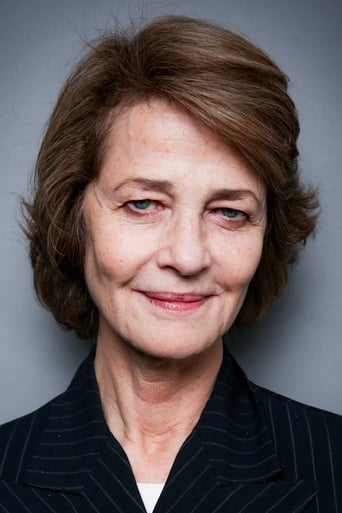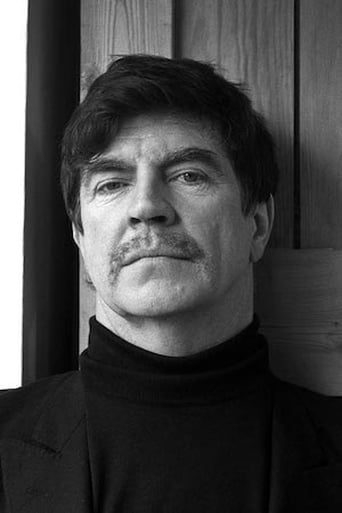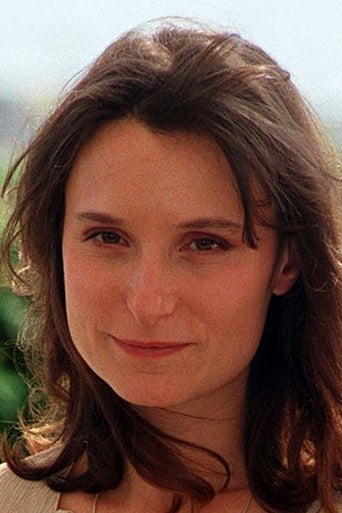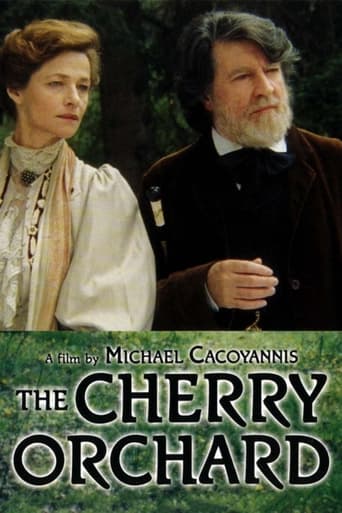
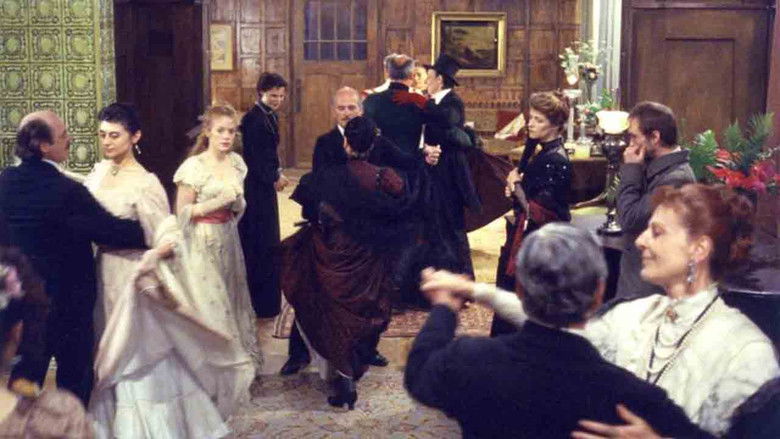
The Cherry Orchard (1999)
Madame Ranevskaya is a spoiled aging aristocratic lady, who returns from a trip to Paris to face the loss of her magnificent Cherry Orchard estate after a default on the mortgage. In denial, she continues living in the past, deluding herself and her family, while the beautiful cherry trees are being axed down by the re-possessor Lopakhin (Teale), her former serf, who has his own agenda.
Watch Trailer
Cast


Reviews
So much average
Pretty good movie overall. First half was nothing special but it got better as it went along.
Fun premise, good actors, bad writing. This film seemed to have potential at the beginning but it quickly devolves into a trite action film. Ultimately it's very boring.
While it doesn't offer any answers, it both thrills and makes you think.
In his adaption of Anton Chekhov's play, The Cherry Orchard, Mihalis Kakogiannis shows a great deal of respect for the 19th century Russian play. In fact, Mihalis shows so much respect for it that he tried to have the film flow and seem very much like a play. Although the technique is an interesting way of trying to adapt a play to film, it ultimately leaves the audience wishing for less of a boisterous staged feel and more of a subtle real life feeling that film can so wonderfully produce. To Mihalis' misfortune the over animated and often over dramatized characters do more to take the audience out of the film than it does to push them into the story. Although the staged feel to The Cherry Orchard does make the film seem to drag on without the interest one would find in a lifelike representation of the events, there is several very significant themes that are important to Russian history that come across very nicely in the film.One of the most interesting aspects of The Cherry Orchard is the way that we see the very different reactions to the emancipation of the serfs. If we look at the two "main" characters of the film, Madame Ranevskaya and Gayev, we see two people that are having a very hard time adjusting to the realities of the serfs being freed. They're not only in constant denial of the economic state of their estate but they are also oblivious to the possibility that former serfs are gaining both power and respect. If we look at how the film expresses the Raznichintzhe class, we see two different expressions. First we see Lopakhin that represents the emerging merchant class in Russian. Although Lopakhin was a former slave, by the end of the film we see that he wields the most respect and power through the active and hard work that he has done as a free citizen. Now on the other hand, Trofimov represents the Intelligentsia class that is emerging towards the later part of the 19th century. His nickname as the perpetual student gives away that he is not about working and doing business in a capitalist society, instead he talks of enacting greater change to help the uneducated freed serf class that now has a ton of freedom and not a whole lot to do with it. Now as Lopakhin showed one of the possibilities for freed serfs Firs showed another. Firs represents a relic of the past, a serf that was more content with being a serf and serving than being forgotten and left behind in the new society. Which is exactly what happens to firs at the end of the movie. Just like Firs, older serfs that could not enjoy the full expanse of their newfound freedom were in a way left behind by society. Although as a movie I believe that The Cherry Orchard could have been a little more intriguing had the director strayed further way from the play format, there are still many interesting aspects to the film that make it a enjoyable piece of Russian oriented cinema. Definitely, worth the watch if you have any interest in Russian life towards the end of the 19th century.
In this era of gratuitous special effects and uneven, even shoddy, production, one cannot depend on Hollywood to successfully transfer a stage play to the screen. This movie is partially the exception, as the movie amazingly pulls itself together in midstream to become a commendable work of art. The first part of this movie is a cinematic disaster. It's boring, slow, and muddled, with a terrible first ten minutes which is supposed to provide some background information about some of the main characters but which is totally disconnected from the main body of the story itself which takes place in a completely different venue. Then as this movie is heading toward a complete cinematic breakdown it amazingly recovers its strength and vitality and becomes crisp, sharp, focused and coherent, conveying a poignant story about torment and suffering in time of change. From that point on all the performances are great, especially that of Michael Gough, Alan Bates and the beautiful Charlotte Rampling who succeeds in capturing the essence of the woman whose whole world is being turned upside down. But despite the strong finish, that one first has to endure a truly bad start before getting to the good part makes this movie a tedious cinematic experience.
The Cherry Orchard is an ensemble piece about a country estate with a famous cherry orchard that is the pride of the province.It is 1900 in Russia and amid the turmoil of social and political revolution, the family and servants at this little corner of the world are caught in a time warp. It is still Imperial Russia with all the privileges for the wealthy and landed gentry. Time goes by, life goes by, wealth disappears, but these people can't be bothered to notice.Charlotte Rampling ("The Statement" 2003) is Madame Ranevskaya who returns, with her daughter, from exile in Paris to her estate to be with her lazy brother (Alan Bates, "Gosford Park"), her adopted daughter, and various servants, friends and freed peasants. Like the large old house, their way of life is rotting away. They are broke and the only thing that will save them from poverty is to sell the land, house and orchard to developers. But the are so besotted with the old life they cannot arouse themselves to make a decision on what to do. And of course, they lose it all.The commentary throughout in the form of asides, laughter and outright contempt, is in the character of the servant Yasha (Gerard Butler, "Dear Frankie"). He serves Madam R, but he gossips about her profligate ways, has contempt for many in the family and takes advantage of the privileges they provide him, including a romp in the orchard with one of the housemaids (Melanie Lynskey,"Shooters"), who he then lectures on her immoral ways. It is a small part, but acts like a Greek chorus to comment on the others.In the end, the doddering valet of Bates is left alone, locked into this decaying house, two old relics forgotten by the aristocrats and the new bourgeoisie. He says to himself "my life has gone by as though I have never lived. No strings - nothing." He leans back in the chair and dies. These people are so careless that no one makes sure the old man has really been taken to a hospital, although they all talk about it, and Yasha keeps assuring everyone he 'knows' he was picked up. So they all just ride off in their carriages and the woodsmen move into the orchard and begin chopping down the cherry trees.The beauty of the cinematography, costumes and piano score of Tchaikovsky music set a mood that is languid and only for those who relish the type of multi-character stories like the recent "Gosford Park." I loved it. 9/10
Cacoyannis began his career filming Greek tragedies five decades ago. Anyone seeing his production of Chekhov's wonderful play knows he adores this work: the discerning casting, the use of Tchaikovsky's little-known piano pieces. Best of all is the look of the production-- its costuming and lighting have the quality of delicate homage. Watch for scenes like the arrival of auction-bidders in a muddy street midway through the film-- a bit of period recreation on a par with Coppola and Scorsese. Chekhov's brilliant bits of stage-business are treasured here: Varya's clobbering her wished-for fiance with a door-slam, Epikhodov's goofs, Yasha's mother-problem, and especially the family's sitting gravely down together before their dispersal. These are lovingly done, and if citing them here is meaningless to those who haven't read the play, I'm afraid the film will mean as little to them, especially on videotape, where the exquisite visuals won't count for much. The acting can't sustain novices-- the cast, especially the males, show the effects of limited rehearsal time, sliding in and out of cohesion. The exceptions to that are Katrin Cartlidge (in a role that often stands-out in stage productions), Ian McNeice, and Michael Gough, delivering the finest performance I have seen from his 50+ years of movie-acting-- acting-teachers should march students to see CHERRY ORCHARD to hear how Gough reads a choice line like, "Now I can die." Cacoyannis nodded in spots: the weird accents affected by the lower-class characters add nothing, and the hammy Act II beggar-- one wants to thrash him. This is not a great film. But the play it serves may be the past century's greatest. At a time when American theaters cannot afford large-cast period plays, a Chekhov-fan feels special gratitude for this production.


